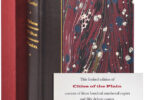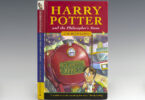 Diana Looser, currently finishing her PhD. in theatre studies at Cornell University, claimed second place in the 2007 Collegiate Book Collecting Contest. Taking some time out from her studies and theatre efforts, she talks with us about how her collection developed out of her personal history and her fascination with Oceanic culture.
Diana Looser, currently finishing her PhD. in theatre studies at Cornell University, claimed second place in the 2007 Collegiate Book Collecting Contest. Taking some time out from her studies and theatre efforts, she talks with us about how her collection developed out of her personal history and her fascination with Oceanic culture.
B: Your collection, “Drama of Oceania”, is a collection of plays from Pacific Island nations. How did you first come to be interested in this material? What inspired you to collect it?
DL: My interest in developing a collection of Oceanic drama began during my first year of university in my home country of Aotearoa, New Zealand, when I took a section on Māori drama as part of a more general course on New Zealand literature. I was immediately attracted to the subject matter and the literary, dramaturgical, and political strategies of Māori playwrights. Initially, I began exploring Māori and Pacific Island drama in New Zealand, but since moving to the United States, I have expanded my purview as I have learned more and changed my perspective on Oceania.
Compiling and reading Oceanic drama has become a key way for me to learn more about the region and many of its pressing social and cultural issues, as the concerns of Pacific communities are often expressed through the content and form of its drama. In particular, I value the opportunities my collecting has provided for forming relationships of mutual support with playwrights, practitioners, and publishers throughout the region. Finally, I believe the act of gathering this material has a significance beyond the collection itself, as one means of demonstrating the achievements of Pacific Islanders.
B: What is your favorite book in your collection?
That’s a tough one, because I have many favorites, for different reasons! I guess the one book I’m really excited about right now contains two recent plays: Frangipani Perfume, by Samoan playwright, Makerita Urale; and Mapaki, by Niuean playwright, Dianna Fuemana. It’s certainly not the rarest item in my collection, but it’s a great example of the work being produced by women playwrights in the region. I bought the book from The Play Press, which is a fantastic local publisher based in Wellington, New Zealand.
B: Did you initially set out to create a book collection, or was it a purpose that evolved out of your interest?
It really evolved out of my interests. I work a lot with my collection, reading, studying, and teaching the plays. I’ve even been in performances of a couple of them. So, it’s certainly a collection that is designed to be used.
B: As a native of New Zealand, currently enrolled at Cornell, do you find there is a cultural gap in the understanding of the material you collect?
I think there is, inevitably. But at the same time, there is a huge diversity of cultures in Oceania, and many perspectives are represented in the drama. As a Pākehā New Zealander, I am often faced with gaps in my own cultural understanding of the plays. I think that’s a good thing, though, as it encourages me to be open-minded and to learn new things.
B: You taught Cornell’s first Oceanic Drama course. How did that come about? What particular challenges did you find in presenting the material?
As graduate students at Cornell, we have the opportunity to design and teach a writing seminar for first-year undergraduates. We can base the seminar around any topic we choose, and so I decided to teach a course on Oceanic Theatre and Drama as a way to introduce some of these plays to a new, young audience. It was extremely rewarding, and I learned a lot through working with the students. In presenting the material, I experimented with audio-visual technologies to find creative ways of filling in some of the cultural context of the plays. The greatest challenge was actually getting the material to begin with, as some of it was very hard to access and took a long time to arrive, and that dictated the structure of my course. We started with the Hawaiian plays because they were the easiest to get in the States, but the last item arrived from Vanuatu during the final week of class.
B: Why do you feel the preservation of Pacific Island plays to be of particular importance?
Creating a collection of Oceanic drama has social, cultural, and historical implications. Not only do such collections ensure that older works are not lost and that current work is encouraged, but bringing the works together from various places within this vast, dispersed and sparsely populated region, and showcasing them collectively, emphasizes the contribution of Pacific playwrights and highlights the dynamism of this growing body of literature. Because of prevailing Western views of the region as a tourists’ paradise, these island communities are not generally associated with the production of articulate, contemporary, political drama. This collection challenges such perceptions of the Pacific Islands, demonstrating how local playwrights have responded and contributed passionately and intelligently to social change.
You completed your first PhD. with a dissertation on New Zealand prison slang. What inspired you to want to explore that topic, and is there any connection to your interest in Island plays?
That was a fascinating experience. The dissertation grew out of my interests in sociolinguistics and varieties of New Zealand English, and in lexicography and criminal argot. I spent three-and-a-half years traveling throughout the country, conducting interviews with men and women in all of New Zealand’s prisons. I did draw upon a wide variety of New Zealand texts, both fiction and non-fiction, for the citations for my lexicon, some of which included drama. But on the whole, my focus on island drama develops from a different set of research interests, although both projects are located in Oceania, and all of the skills that I have learned are valuable for my current research.
Upon completion of her current studies, Diana intends to continue to pursue an academic career in Theatre and Performance studies.






